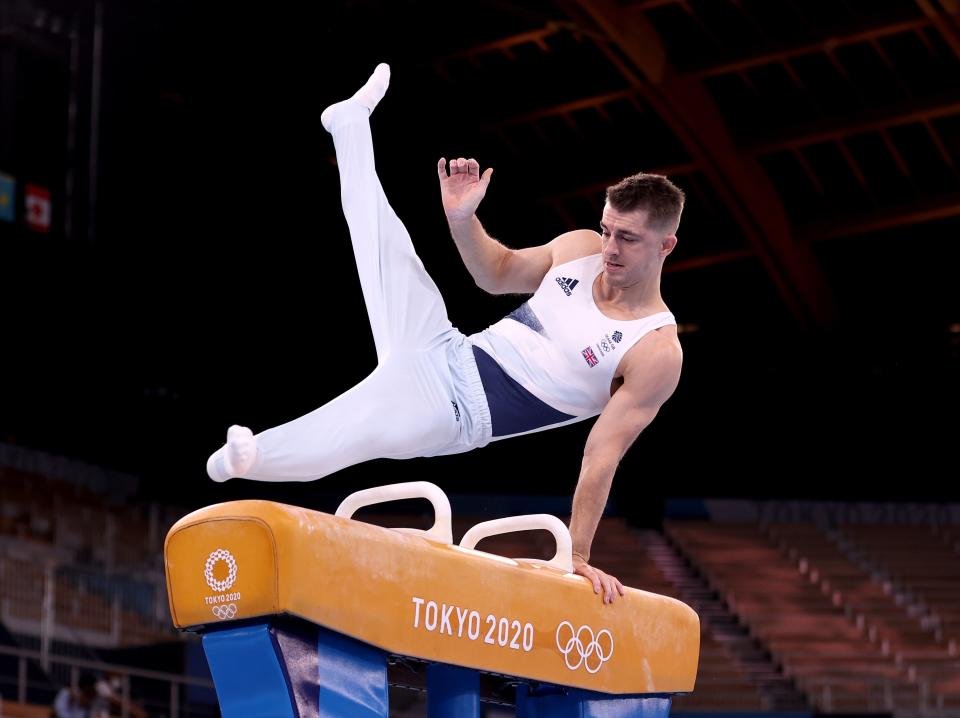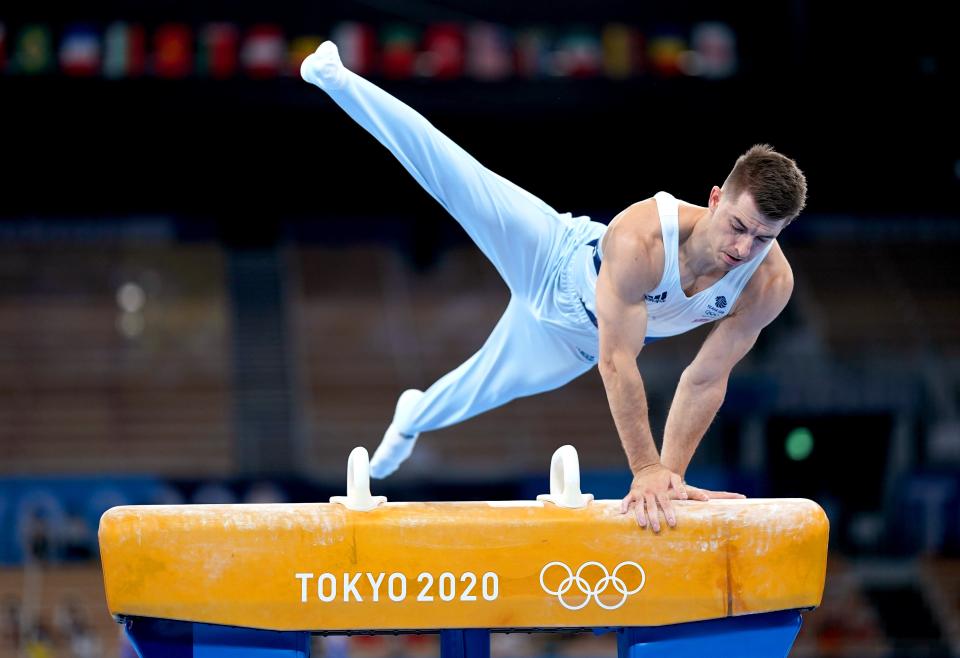Max Whitlock banishes nerves to grab gold on pommel horse and retain title at Tokyo Olympics
For the first time in 30 years, someone has defended an Olympic pommel horse crown. Less surprising is that man is Max Whitlock.
With his most difficult routine, he accrued an unassailable 15.583 to retain his status from Rio as an Olympic champion, taking his overall tally of golds to three and setting him out as an unreachable standard to his rivals. Not since John Wayne has anyone made such thrilling action in the saddle look so natural.
Yet the gravity of this event seemed to give the 28-year-old a palpable bout of nerves that threatened to eat him alive. He was noticeably contemplative as the finalists were presented to those in the Ariake Gymnastic Centre, and a gibbering wreck once he was done and had to sit through the other seven trying to get the better of him.
“This was the most nervous I’ve been for any competition I’ve done in my whole life,” he admitted. “Retaining titles is 10 times harder than chasing. Today’s proved that to me.
“It’s a million times harder. What I’ve learned this time – and I didn’t realise exactly what it was that made it 10 times harder – is the feeling you know you’ve done it before. That feeling of winning Olympic gold is crazy and you want to experience it again.”
In between the before and after, he was at his most calm: nailing a set-piece with such precision that, from the bleachers at least, his subsequent fear seemed unfounded. He is too modest to say so, but he is unquestionably the best gymnast of his generation. Certainly the most successful on the pommel horse, with a second Olympic gold to go with three in the World Championship.
It takes him to six medals from three games, which takes him into Olympic royalty territory. Only cyclists Sir Bradley Wiggins, Sir Chris Hoy and Jason Kenny have more than Whitlock.
Even so, there was plenty for Whitlock to contend. Qualification on Saturday was sketchy, devoid of his usual rhythm. He got through in fifth, relatively satisfied he’d made it but knowing he needed to give more in a hugely competitive field. And the small measure of launching a defence of an Olympic title.

He told of the pressure to continue GB’s run – “medals are flowing” – and certainly did his bit by registering the 10th gold. But the morning was fraught with worry given the late start, and the usual considerations that come with operating on the toughest apparatus in the gym, along with the one-and-done nature of a final.
Whitlock was also picked at random to go first – he’d never done that before – and there was a sense from those around the 28-year-old that he had the rough end of the draw. “It was the first time I’ve managed to watched a pommel final live,” he joked.
Success at Rio 2016 was achieved on the penultimate turn, giving him a sense of what score he needed to better. Once he had his score of 15.966, top at the time, he knew he was guaranteed at least silver before the final gymnast, David Belyavskiy of Russia, fell off the horse to confirm gold.
This time, Whitlock set the tone, emphatically: fluid, powerful and commanding with the hardness of the routine giving him a difficulty rating of seven. The conviction during his 60 seconds, however, was at odds with the worrisome 40 minutes that followed.
The most fraught moments came from those who went on to share the podium with him. Lee Chih Kai of Chinese Taipei gave him the biggest cause for concern. Legs like hurricanes, hands like pillars, the 25-year-old looked to have pushed Whitlock close. And he had, just not close enough – a score of 15.400 just 0.183 short.
Last to go was the eventual bronze medalist, Kohei Kameyama, whose effort was not quite to Chih Kai’s level, though Whitlock was clearly fixated on a worst-case scenario where gold was to be snatched from his hands at the death. He looked to the floor and shook his head once the Japanese’s time was up, and then looked to the roof of the arena in relief when a score of “only” 14.900 was registered.

Falls for Ireland’s Rhys McClenaghan and Wei Sun of China were particularly handy. The pair were deemed Whitlock’s biggest threats going into Sunday evening, and yet both lost their handles to finish seventh and eighth respectively. Yet it spoke of Whitlock’s performance that you could argue these two usually unflappable gymnasts were daunted by what they had to perform to threaten it.
Whitlock’s journey, though, is not over. The next step, he hopes, is Paris, and a potential three-peat.
“I said before I came in, I’d like to carry on – shorter cycle which helps. As I get older it gets harder, more challenges, no doubt about that. Three years until Paris.
“I had three weeks off after London, three months off after Rio, not enough time to have three years off this time. But I will have a long break, I’d like to go on a few holidays, enjoy it, spend some time with everyone who has helped me get to this point and come back to the gym.”
He also has a legacy in mind of getting a move on the pommel horse named after him. Such an honour is bestowed upon an athlete when they complete a unique move in competition. Though he has tried and nailed a signature move in training, he has yet to successfully do so when it matters.
“The Whitlock,” he mused. “Hopefully still penned in on pommel. I’d like to do it, the highest valued skill on pommel. The hardest ever done. I’d like to get my name in the code of points. That’s one dream I’d like to do: air flair on a pommel horse. I’ll give it a go.”
The move involves taking both hands off the pommel. And even with all his tangible accomplishments, it would be apt for Whitlock’s legacy to be exhibiting control on the pommel horse without actually being on it at all.
Read More
Olympics 2021 schedule: A day-by-day guide to the Tokyo Games
Why is Russia banned from the Olympics and what is ROC?
Olympics skateboarding schedule: When will Sky Brown perform?

 Yahoo News
Yahoo News 
